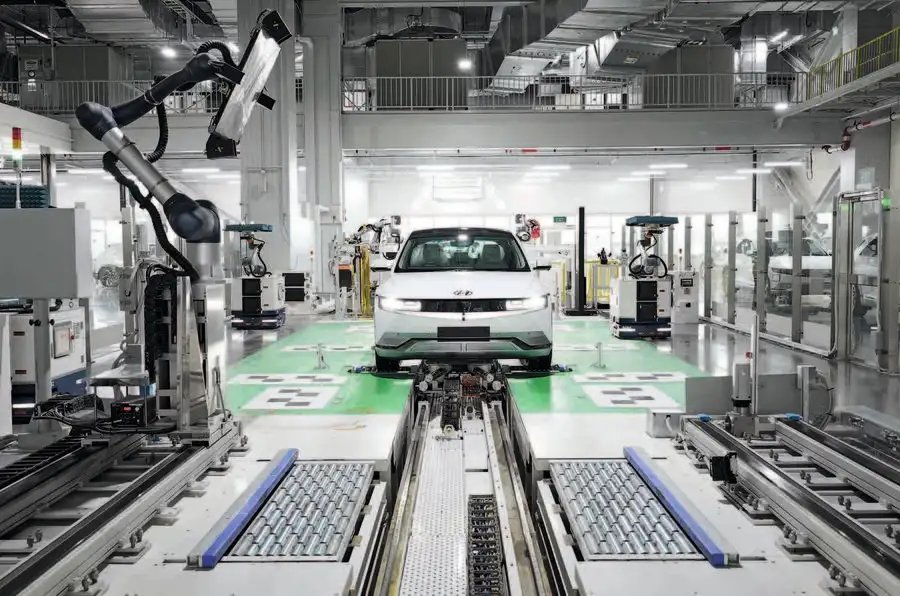Hyundai opens new AI factory with robot dogs and on-site farm

Hyundai can now build and deliver cars just six hours after an order is placed using factories that are minimally staffed, run by artificial intelligence (AI) and use robots to do the key manufacturing work.
Showcased for the first time at the Korean brand’s new Innovation Centre in Singapore, this ‘Smart’ facility – currently producing the Hyundai Ioniq 5 and, from 2024, the Hyundai Ioniq 6 – will be used as a test bed for scores of similar sites that will pop up in cities around the world, with the UK not ruled out.
These new-era electric car factories will serve local urban markets, with a major focus on personalisation and customer experience, as part of a major push towards taking the brand upmarket.
“This isn’t just a factory: it’s a customer experience centre,” said factory boss Alpesh Patel. “Customers can interact with us in a close way.”
This process starts in the ‘Ioniq Lounge’, where customers create and order a bespoke Hyundai. (Some options will be exclusive to the site.)
They are then taken to a virtual reality suite to view a simulation of the car being created, before a screen rises to reveal the actual factory floor, and the actual car.
From there, they head to the site’s restaurant to eat produce grown on site at Hyundai’s robotically maintained Smart Farm, before watching the car be test driven on the factory’s roof test track, à la Fiat’s old Lingotto plant in Italy.
Finally, the completed car is delivered to the foyer by autonomous robots. Why this sudden push towards customisation? “When you look at the value proposition of personalising, it starts making far more sense to do it,” said Patel.
He added that a full “mass personalisation” offensive will be rolled out in the next few years to Hyundai’s wider line-up to capitalise on the growing trend.
AI to take the lead
The part-human, part-AI-powered workforce uses a meta factory (a digital twin) to run simulations for processing upcoming jobs, such as large shipments, to work out where to send robots at any given time and how many to deploy.
The goal is to allow the AI brain to take the lead on both day-to-day operations and future planning, in tandem with a human counterpart based in a digital command centre.
“We want to blend monitoring with prevention,” said Patel. “What we have here is the baseline. By 2027, we want this to be an autonomous being with a human to confirm, not react.”
The factory also uses cell-based manufacturing, a flexible production method that allows for many different models to be produced on the same line at the same time without the need to reconfigure stations. Together with an army of artificially intelligent robots that do everything from moving stock to quality control and parts fitment, this allows the Singapore factory to operate with just 29 technicians while producing 70 cars a day (“this number could grow”) during one eight-hour shift.
Patel said: “We use less people, but they do more technical jobs.” Asked what this means for lower-skilled workers, he acknowledged those jobs would be lost, but upskilling workers to these AI-assisted technical roles was the next move.
“Ultimately, the applications that we envision are that the AI will help the worker. It’s all about productivity and training,” said Patel.
This tech-heavy set-up is unlikely to be rolled out at more traditional factories, said Patel, such as the massive Ulsan plant in Korea, where 34,000 workers produce 5600 vehicles daily. However, he added that anything that improves efficiency would be considered.
Cars with jobs
Hyundai wants to use the Smart factories as hubs for a shared mobility model, with vehicles that use one platform but swap out interiors for easier production.
These could be self-driving vehicles built for specific tasks, including hosting on-the-go meetings or transporting workers to the factory.
“These are vehicles that are personalised to a moment, rather than a person,” said Patel.
“Modes of transport can be used in different contexts. That is where we are looking to create purpose-built vehicles that could have a standardised chassis and propulsion, with the insides personalised for various needs.”
He added that “there is no limit” to which type of vehicle can be made in these factories. With that in mind, the brand also confirmed that, from 2028, these production lines will be able to build its Urban Air Mobility vehicles – another benefit of the cell-based production method.
Related News
